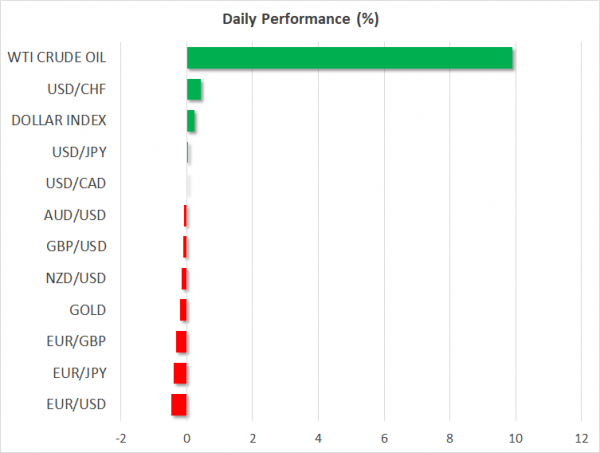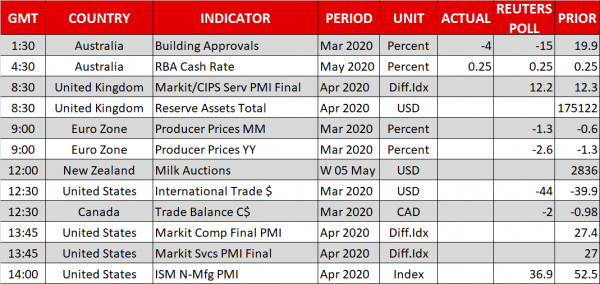- US stocks bounce back on medical headlines, rising oil prices, tech strength
- But FX market signals caution – yen and dollar hold strong, gold too
- Are investors piling into tech because of re-opening fears and US-China tensions?
- Euro suffers after German court decision on ECB QE
Stock markets storm higher
Wall Street continues to defy economic gravity, with all three major US stock indices recouping early losses on Monday to close higher, brushing aside the simmering tensions between Washington and Beijing. Futures point to a higher open today as well, with the recovery being powered by a blend of medical news, rising oil prices, and hopes for a smooth economic re-opening.
On the medical front, scientists discovered an experimental antibody that can reportedly defeat the virus in a lab. This is still in its early stages, as it hasn’t been tested on animals or humans yet, but it could be promising. In energy markets, oil prices climbed on reports that stockpiles at Cushing – the main US delivery point for crude – rose at a much slower pace last week, easing storage concerns. Meanwhile, California announced that some retail stores may re-open by Friday.
Looking just at stock market indices, one could conclude that the worst has passed. States are opening up for business again, and if crude stockpiles are indeed rising slower, then Americans are probably driving more already.
But many are still ‘playing defense’
Yet, the FX market tells a different story. Defensive plays like the yen and the dollar continue to outperform most peers, while in commodities, gold prices remain stubbornly elevated around $1700/ounce. More importantly, the real driving force behind the latest stock market gains were – once again – giant tech names like Microsoft and Apple that seem highly resistant to this crisis, not cyclical growth-oriented companies.
The bottom line is that yes, the overall stock market is rising, but not because there has been some real fundamental change to the economic outlook. Rather, investors are still using the same crisis playbook, buying tech giants that are best equipped to weather this recession while simultaneously hedging some risk by piling into the yen, dollar, or gold.
What does it all mean? Fear is still very much in the air. Nobody knows whether the re-opening process will go smoothly, and many worry that some US states may be going back too quickly given their high virus numbers. Meanwhile, US-China tensions are back with a vengeance, and it’s becoming clearer that this stay-at-home crisis could leave deep scars on consumer behavior.
All this makes big tech names even more attractive: they are less vulnerable to trade tensions and will continue to thrive even if the economic re-openings are botched. Yet, the more concentrated the market at the very top, the easier it is for it to drop sharply if any of these tech titans sell off. A lasting, healthy recovery will need participation from the entire market, not just a handful of tech names. The risk of another bearish turn remains elevated.
Euro ticks up after German decision, aussie yawns on RBA
In FX land, the yen and the dollar continue to hold strong this week, mostly at the expense of the euro. Germany’s top court just decided that the ECB’s bond-buying program ‘partially violates’ the constitution, sending the euro lower as the decision could limit the central bank’s ability to enlarge its stimulus programs, hindering growth and financial stability.
In Australia, the RBA kept rates unchanged and said nothing new at its meeting today.
As for the data today, all eyes will be on the ISM non-manufacturing PMI for April.


